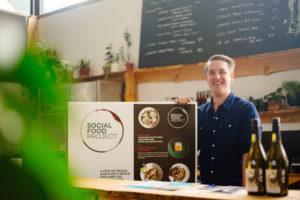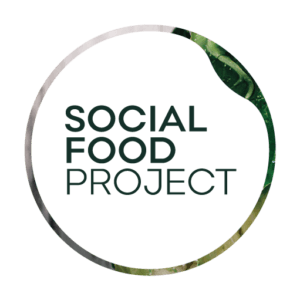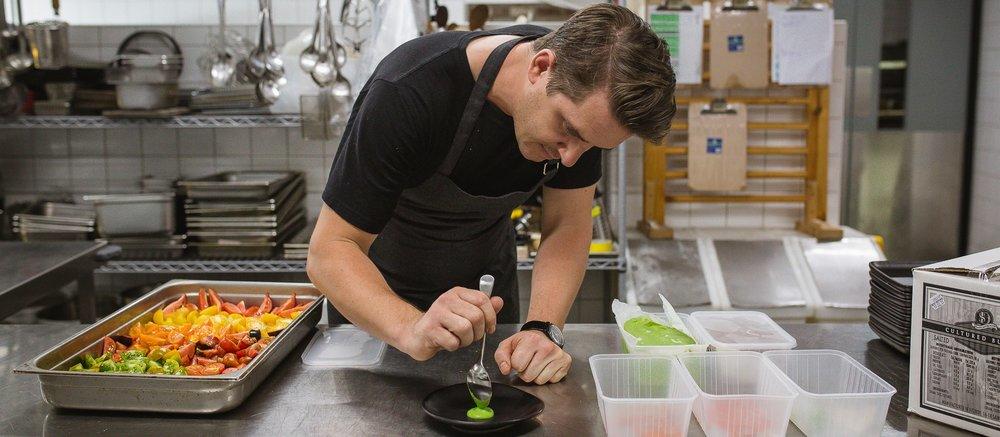In this post
Change Careers, Change the World: How a Chef Became a Sustainable Food Educator

What do you do if you long for something more meaningful, but you’re still in love with the industry you work in?
Ben McMenamin, the founder of The Social Food Project, shows us how to reinvent our careers, the industry, and the world by taking a fresh look at what you love.
We spoke with Ben at his new pop-up venue in the Prahran Market about his career journey in food and sustainability.
Ben’s career journey
 When Ben Mac took his first job in a cafe kitchen as a teenager, he was roaming the globe, in need of work but unsure of his path.
When Ben Mac took his first job in a cafe kitchen as a teenager, he was roaming the globe, in need of work but unsure of his path.
Fourteen years later, after working in some of Australia and New Zealand’s most prestigious kitchens, he’s a professional chef, food educator, sustainability advocate and social entrepreneur.
Ben founded the Social Food Project three years ago, a business that’s all about sustainability education, building community, and connecting people through food.
 Ben and his team share stories and ideas behind the food on our plates through experiences like interactive workshops, pop-up venues and community events.
Ben and his team share stories and ideas behind the food on our plates through experiences like interactive workshops, pop-up venues and community events.
The Social Food Project is not your typical business. It’s a social enterprise, meaning that rather than aiming to make a profit for profit’s sake, it invests that profit into social projects that aim to make a positive impact on the world.
Getting started as a chef
So how did a travelling kitchen hand find himself at the intersection of food and sustainability, driving change in his industry?
Let’s wind back to the start of the story.
In his first cookery job, Ben quickly realised that he loved working in the kitchen. Returning from his travels to New Zealand, he completed a Certificate IV in Cookery through a traineeship while working at Clooney, ranked New Zealand’s Number 2 restaurant at the time for its innovative cuisine. Since he was able to gain recognition for industry experience, he earned his Cert IV through on-the-job learning in just 18 months. His employer at the time supported him to complete the course.
Moving to Melbourne, Ben’s career took off, cooking at local institutions Supernormal and Cumulus, Inc. in the heart of the city. Before long, the scenic Yarra Valley called, and a stint at the award-winning winery Oakridge.
Working in the restaurant industry
From the moment he stepped foot in the kitchen, Ben knew it was an environment where he could thrive. “I really loved the high-pressure, the sociability of it, the creativity,” he remembers.
He sees it as a challenging but uniquely engaging industry. “You have so many opportunities to learn new things and to improve your skills, and there’s always a sense of excitement and newness around food and cooking – which I don’t think a lot of other industries have.”

Photo courtesy of The Social Food Project’s Facebook.
A challenging reality
Despite his love of hospitality and cooking, the industry is not without its challenges. Ben stresses that to last in hospitality, “you have to be able to really love it.”
The “Masterchef syndrome,” as he calls it, or the expectation of a meteoric rise to fame after only a couple of years of cooking does not reflect the real world. “If you don’t love it, then it’s gonna be hard, so you’ve gotta love what you do.”
A role in hospitality often becomes more complex and challenging as your career matures and you move up the kitchen hierarchy, rather than more straightforward and more comfortable. That’s partly the reason why, after 10-15 years in the kitchen, talented chefs drop out of the industry or change tracks.
Ben’s top qualities for aspiring chef to cultivate
Problem-solving
“Whenever you’re cooking it’s often a big problem-solving endeavour, so it’s thinking about how you can match orders to customers, staffing, to prep, to service. There are a lot of problems that you need to work through – often on the spot – as well. Like, if something happens, what are you going to do right now to fix the problem? So there’s a lot of problem-solving that’s required.”
Resilience & self-care
“Being able to build up resilience so that you can deal with the hard times, you can deal with the pressure, you can deal with the stresses that do come with it. That’s something that can grow as you get more experienced. And it also comes with self-care. So it’s thinking about keeping yourself healthy, having good social relationships, generally staying on top of your health: it makes a big difference when being resilient.”
Flexibility is a redeeming part of working in the hospitality industry. Unlike other occupations, there are usually full-time and part-time hours available. The constant demand for new staff makes it easier to find a role that you can balance with side projects or even further study – which is exactly what Ben did next.
From career changer to changemaker
It was during this time that the seeds of his interest in sustainability began to take root, and he knew it was time for a career change – but not necessarily to a new industry.
After some research around the issues in our food systems, Ben decided to find a way to make a difference within the food industry that he loves. “The question was ‘how can I use my skills as a chef to bring about a better world?’”
This line of questioning led him to RMIT’s Bachelor of Environment and Society, a course that delves into the relationship between people and the planet. Ben was able to weave food throughout his studies while continuing to work as a chef in some of Melbourne’s top restaurants. When he finished, he used the knowledge and insight gained through his qualification to start a social enterprise – the Social Food Project.
The Social Food Project: at the intersection of food and sustainability
The Social Food Project sees and addresses some big problems in humble ways. In these hyper-globalised times, cooking and eating enjoy a privileged status in our culture. We come together over a shared dinner, but we are often unaware of its story. Who grew it, where do they live, and how did it get to our plates?
Our food production system, (that is, the way produce is grown, processed and distributed) is complex and impressive. But it’s also fragile – reliant on the many interconnected networks of the global economy to keep working.
The Social Food Project
Add a dash of social isolation, climate change, environmentally destructive farming, and you have trouble brewing: food insecurity. By building community and connecting us to sustainable food systems, Ben’s social enterprise seeks to find solutions, and enable us to create a better world together: one that’s more resilient and connected.
Sustainability, as it’s understood today, has three parts. A traditional company only has a financial bottom line – meaning they exist to make a profit. In contrast, a social enterprise has a triple bottom line: social, environmental and economic.
Making it work: the triple bottom line
The Social Food Project looks at all three sides of sustainability. It provides services, like catering, pop-up events, and restaurant consulting, to fund its community events and workshops.
The business model is financially sustainable, which means the Project can go on educating, advocating and building connections into the future.
What is Restaurant Consulting?
One of the services which fund their community events.
Typically involves:
- Menu design
- Staffing
- OHS
- Communicating a brand
- Procuring local, sustainable ingredients
- Food waste audits
- Staff morale
- Building a good team
What is Event Consulting?
“We’ve worked quite a bit with the local council, worked quite a bit with the City of Melbourne doing food-related things.”
Food curation
“One of my roles for the past three years has been as a food curator for Melbourne Knowledge Week, which is a week-long festival hosted through the City of Melbourne… I’ve helped them to do their food stream to do programming and to do pop-up events, throughout the festival.”
Running a food event with 6 weeks lead-in
Weeks 1 & 2
Finalise the concept, get your branding done, update listings, and lock in partners.
Weeks 3 & 4
Promotion, including social media, newsletters, and selling (hopefully) lots of tickets.
Weeks 5 & 6
Finalise menu, source ingredients, sort out your staffing, and plan the infrastructure at the venue, e.g. chairs, tables, glassware, cutlery.
3 days out
Prepping, packing, and finally – delivering the event in all its glory.
What it’s like to start a social enterprise
The most challenging part of Ben’s new path has been getting a new business off the ground. In the beginning, he says, it was a slog and there were setbacks, “but you have to keep going, trust in your ability to be able to build something.”
He’d receive torrents of positive feedback about the concept, but the idea alone “doesn’t necessarily pay the bills.”
Three years in, it’s financially sustainable, and it’s given Ben a whole new perspective on the food and hospitality industry.
He urges anybody who wants to start a business to go for it but warns them that’s it’s not easy.
“Anyone who wants to start a business, I’d say absolutely do it, but be prepared to put in some hard hours and to have some very stressed moments.”
“If you’re committed to it, and you’ve got a good idea, then it should come right.”
Now, instead of plating up in the kitchen or delivering events himself, Ben’s running the business administration side of things remotely from London. Never one to rest, he’s taken on a Master’s of Food Policy at London University so he can gain a deeper understanding of the problems and potential solutions in the way we produce and consume food.
He feels lucky to have found a way to combine his love of cooking, events and hospitality with an opportunity to co-create a better world.
What’s next? The future of food
Ben finishes his Master’s of Food Policy in September 2020, and he’s open to whatever the future brings. Whatever the next step for him, it will take place “at the intersection between food and sustainability, hopefully working with some really great people around the world, thinking about how we can do food better.”
Part of that includes events such as Utopian Foods, an event that prompts attendants to imagine what the future of food might be, and how we might make that a sustainable, ethical one.
His advice for anybody starting out as a chef? Think about sustainability and try to incorporate it into your practices, into your food. “That’s the direction that our industry and our whole planet is moving towards.”
Complete Guide to Becoming a Chef
Learn everything you need to become a chef and get your start in the culinary arts industry.
The future of food, and the food industry, is up for grabs. It’s open to imaginative solutions and fresh perspectives. In a similar way, small steps in the right direction can take your career in a direction you never could have imagined.
You never know where your next step could lead you.
Latest Articles
How to Apply for Work Placement: Tips & Resources
Congratulations! You’re about to embark on an exciting journey where you will practise and develop t...
11 Hobbies That Can Make You Money: Use Your Passion for Profit
Hobbies often get a bad rap. They’re seen as just a way to kill time, a mindless escape from t...
Is The Job You Hate Killing You? Why You Need to Make a Change
Do you hate your job? Studies show that staying in a job you hate has negative health effects and ev...
Want to read more?
More than Physical Support: A Realistic Look at Aged Care Worker Duties and Skills
Thinking of getting started in the caring career of aged care? Learn about the various duties and re...
How to Become a Childcare Worker: 5 Things You Need to Know
Considering becoming a child care worker? Find out how this important job can lead to a fulfilling,...
Enrolled Nurse vs. Registered Nurse: Who’s Who?
Nursing is a fulfilling, exciting and financially stable career within our booming healthcare indust...
